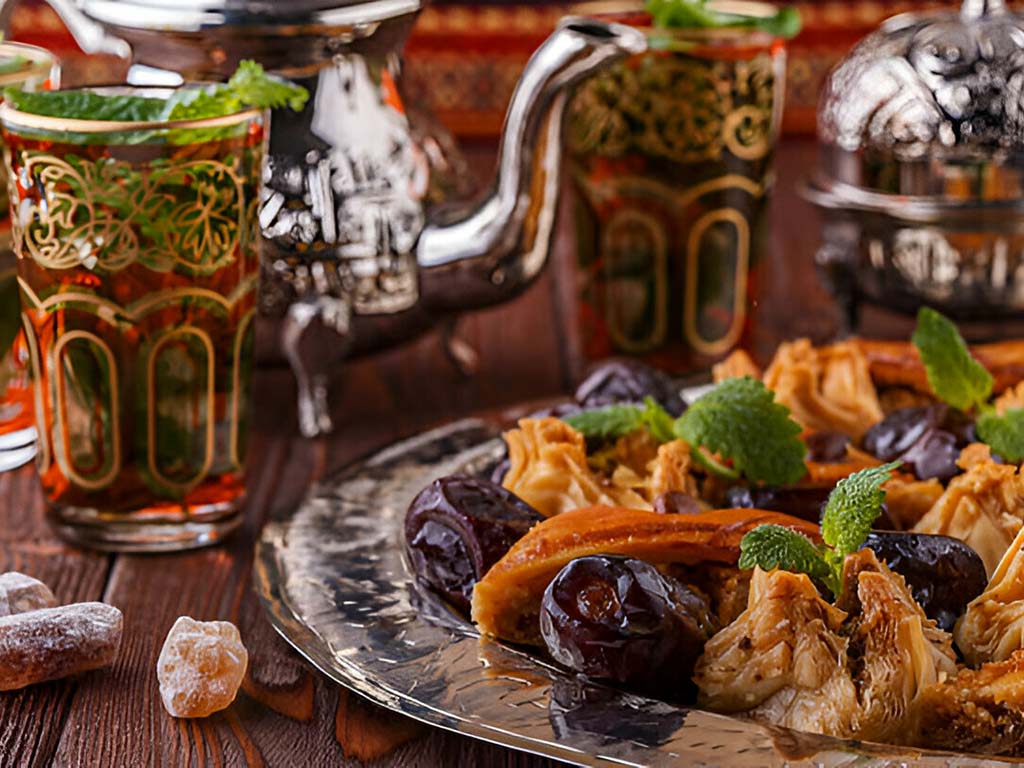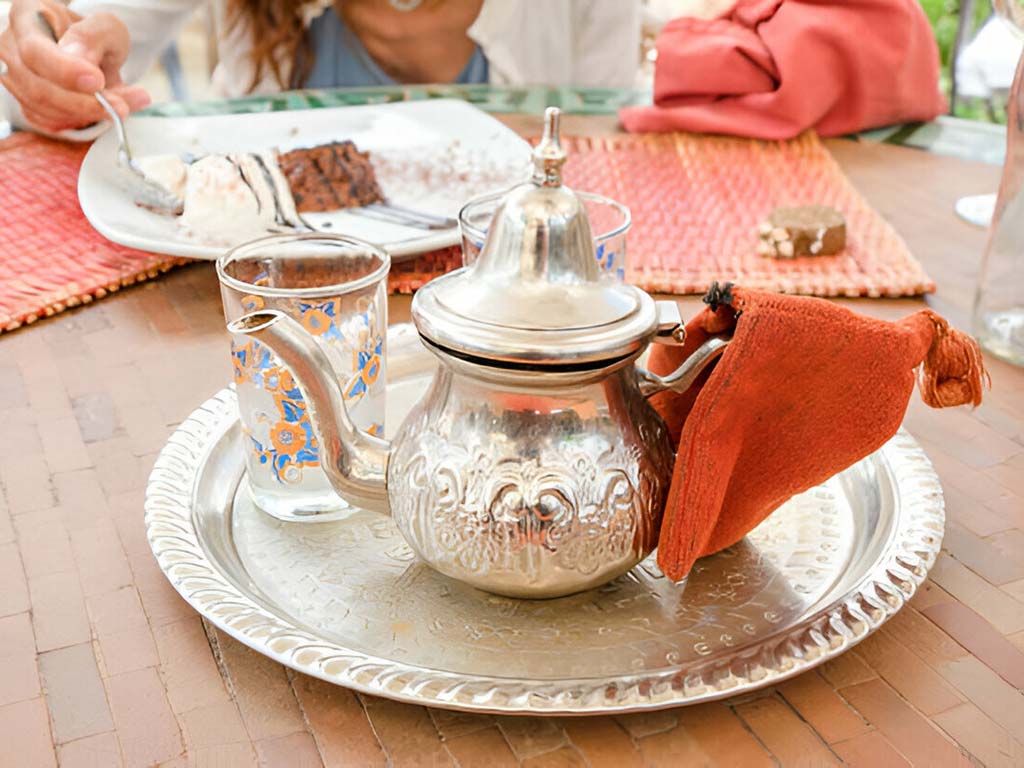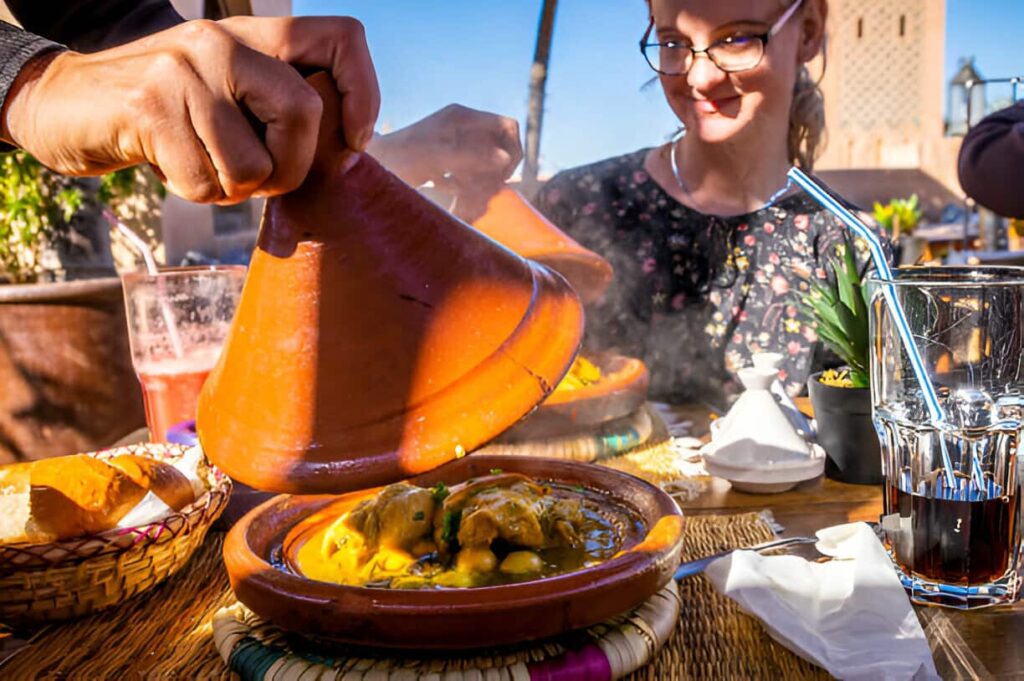Moroccan hospitality is famous around the world. In Morocco, treating guests with kindness and generosity is very important. This tradition has deep roots in the country’s culture and history. People in Morocco believe in making visitors feel like family. They show their warmth through various customs and social traditions.
When you visit a Moroccan home, you can expect a warm welcome. Hosts often greet guests with dates and milk, symbols of hospitality and good luck. This is the beginning of the many special practices that make Moroccan hospitality unique.
Understanding these customs helps visitors appreciate the rich culture of Morocco. Knowing how to behave as a guest ensures you show respect to your hosts. It also allows you to enjoy a more authentic experience.
Customs in Moroccan Hospitality
Moroccan customs are rich and colorful. When you visit a Moroccan home, you will see many unique traditions. These customs show the warmth and kindness of the Moroccan people. Let’s look at some of these special practices.
When guests arrive, the host greets them warmly. A common greeting is offering dates and milk. Dates are sweet and symbolize happiness. Milk stands for purity and good health. This warm welcome makes guests feel special and valued.
Hosts often greet guests with a friendly hug or a handshake. In some areas, people may also kiss on both cheeks. This friendly gesture shows respect and joy at seeing their guests.

In a Moroccan home, the seating arrangement is important. Guests are given the best seats, usually in the living room. These seats are often comfortable cushions or sofas. This shows that guests are honored and appreciated.
Sharing meals is a big part of Moroccan hospitality. Hosts serve delicious traditional dishes. One popular dish is couscous, a tasty mix of grains and vegetables. Another favorite is tagine, a flavorful stew cooked in a special pot. Meals are often shared with a large communal dish, symbolizing unity and togetherness.
The tea ceremony is another special custom. Moroccan tea is made with green tea, mint leaves, and sugar. It is poured from a teapot held high above the glasses. This creates a frothy top, which is a sign of good tea. Serving tea is a sign of friendship and respect.
Guest Etiquette in Morocco
When visiting Morocco, knowing how to be a good guest is important. Showing respect for the host and their customs is key. Here are some etiquette tips to help you.
In Morocco, guests should remove their shoes before entering the home. This keeps the house clean and shows respect. Hosts may offer slippers to wear inside.
Dressing modestly is also important. Both men and women should wear clothing that covers their shoulders and knees. This shows respect for the culture and the host.

When talking to your hosts, be polite and friendly. It is good manners to greet everyone in the room. Saying “Salam” means peace and is a common greeting.
Respecting elders is very important in Moroccan culture. Always greet older people first and use polite language. Showing appreciation for their wisdom and experience is valued.
Participating in conversations is encouraged. Ask questions about the culture and traditions. This shows you are interested and respectful. Listening carefully and not interrupting are also important.
Social Traditions in Moroccan Hospitality
Social traditions play a big role in Moroccan hospitality. These customs make gatherings special and memorable. Let’s look at some of these traditions.
Eating together is a key part of Moroccan hospitality. Meals are often shared from one large dish. This practice brings people closer and shows unity. A popular meal is couscous, served with vegetables and meat. Another favorite is tagine, a stew cooked with spices and served in a clay pot.
Eating with hands is common, but always use the right hand. This is a sign of cleanliness and respect. Guests should wait for the host to start eating. It shows good manners and respect for the host.
Storytelling is a treasured tradition in Morocco. Stories are told to entertain and teach lessons. They often include tales of adventure, wisdom, and humor. During gatherings, it is common for someone to share a story.
Music and dance are also part of Moroccan social traditions. Traditional music includes the sounds of drums, flutes, and string instruments. People often dance to the rhythm of the music. These activities create a lively and joyful atmosphere.
Understanding Moroccan Hospitality
Islam is the main religion in Morocco. It greatly influences hospitality. Being generous and kind to guests is a key part of Islamic teachings. Moroccans believe that treating guests well brings blessings.
Spirituality also plays a role. Many customs in hospitality are tied to religious beliefs. Offering dates and milk is one example. These foods are not only nutritious but also have a spiritual significance.
Different regions in Morocco have unique hospitality practices. In the cities, you might find more modern customs. In rural areas, traditions are often more preserved.
For example, in some mountain villages, guests are welcomed with a special bread called “tafarnout.” Each region adds flavor to Moroccan hospitality, making it diverse and rich.
Comparison with Hospitality in Other Cultures
Comparing Moroccan hospitality with other cultures helps us see what makes it special. Let’s look at some similarities and differences.
Moroccan hospitality shares many features with other Middle Eastern cultures. Offering food and drink to guests is common. Like in Morocco, welcoming guests warmly is important in places like Saudi Arabia and Egypt. Sharing meals from a large dish is also a common practice.
Respect for guests and elders is another similarity. In many Middle Eastern cultures, it is important to greet and treat guests with the highest respect. This shows kindness and honor.

What makes Moroccan hospitality unique are its specific customs. The tea ceremony, with its high pouring and mint tea, is special to Morocco. The way Moroccans use spices in their food is also unique. Dishes like tagine and couscous have flavors you won’t find anywhere else.
Another unique aspect is the deep-rooted tradition of storytelling. While other cultures have storytelling, the Moroccan way of weaving tales during social gatherings is distinct.
Conclusion
We have explored many aspects of Moroccan hospitality. We learned about the warm greetings with dates and milk. We discussed the importance of removing shoes and dressing modestly. We saw how communal meals and storytelling play a big role in social gatherings. We also compared Moroccan customs with other cultures.
When visiting Morocco, remember these tips. Greet your hosts with a smile and say “Salam.” Remove your shoes before entering a home. Dress modestly to show respect. Enjoy the delicious food and take part in the tea ceremony. Listen to stories and join in the conversations.
By following these customs, you will show respect and enjoy a richer experience. Moroccan hospitality is all about making guests feel welcome and valued. Embrace these traditions and enjoy your time in Morocco!
